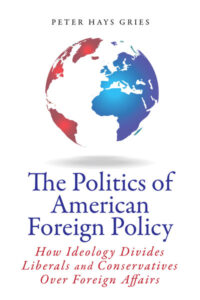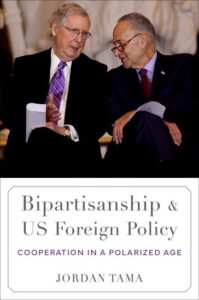 Do domestic political conflicts still stop at the water’s edge, a sentiment first expressed by Sen. Arthur Vandenberg, in January 1945, as he announced his conversion from isolationism to internationalism (as Bruce Stokes observes in Foreign Policy).
Do domestic political conflicts still stop at the water’s edge, a sentiment first expressed by Sen. Arthur Vandenberg, in January 1945, as he announced his conversion from isolationism to internationalism (as Bruce Stokes observes in Foreign Policy).
Politicians in democracies are compelled by their own interests to be responsible in their decisions about national policy. So when politicians who oppose bipartisanship in foreign affairs nevertheless support the president on a given policy, foreign adversaries are more likely to back away from confrontation and opt for negotiation, analyst Bruce Bueno de Mesquita noted for the Hoover Institution.
Countering Global Authoritarianism
A number of members of the U.S. Congress are expressing concern about the decline of democratic norms around the world. For instance, bipartisan coalitions have spoken out on Russian meddling in foreign elections and rising antidemocratic forces in Turkey and Venezuela, according to a recent CSIS analysis:
Building on recent legislation, such as the Countering America’s Adversaries Through Sanctions Act (CAATSA) of 2017, Congress can continue to counter global antidemocratic forces and human rights abusers through targeted sanctions efforts. The House Democracy Partnership (HDP) has been a galvanizing force on democracy promotion issues, and its members have shared their expertise with fellow legislators.
 Because the United States is a democracy, the polarizing impact of ideology on the international attitudes of the American people shapes American foreign policy, Peter Hays Gries contends in The Politics of American Foreign Policy: How Ideology Divides Liberals and Conservatives over Foreign Affairs. Given that the United States is a superpower whose foreign policy will have a major impact on the prospects for war and peace in the twenty-first century, a better understanding of the polarizing role of ideology on its foreign policy is urgently needed.
Because the United States is a democracy, the polarizing impact of ideology on the international attitudes of the American people shapes American foreign policy, Peter Hays Gries contends in The Politics of American Foreign Policy: How Ideology Divides Liberals and Conservatives over Foreign Affairs. Given that the United States is a superpower whose foreign policy will have a major impact on the prospects for war and peace in the twenty-first century, a better understanding of the polarizing role of ideology on its foreign policy is urgently needed.
In an article in The Atlantic in 2020, veteran U.S. diplomat William Burns observed that “in the past, a sense of common domestic purpose gave ballast to U.S. diplomacy; now its absence enfeebles it,” American University’s Jordan Tama wrote for Foreign Affairs.
In an era of ever-increasing polarization in the US Congress, American foreign policy remains marked by frequent bipartisanship. In Bipartisanship and US Foreign Policy, Tama shows that, even as polarization in American politics reaches new heights, Democrats and Republicans in Washington continue to cooperate on important international issues.
 Looking closely at congressional voting patterns and recent debates over military action, economic sanctions, international trade, and foreign policy spending, Tama reveals that bipartisanship remains surprisingly common when US elected officials turn their attention overseas. Yet bipartisanship today rarely involves complete unity. Instead, bipartisan coalitions spanning members of both parties often coexist with intra-party divisions or disagreement between Congress and the president, making it difficult for the United States to speak with one voice on the global stage.
Looking closely at congressional voting patterns and recent debates over military action, economic sanctions, international trade, and foreign policy spending, Tama reveals that bipartisanship remains surprisingly common when US elected officials turn their attention overseas. Yet bipartisanship today rarely involves complete unity. Instead, bipartisan coalitions spanning members of both parties often coexist with intra-party divisions or disagreement between Congress and the president, making it difficult for the United States to speak with one voice on the global stage.
Wednesday, October 11, 2023. 4:00 PM – 5:30 PM EST. Abramson Family Founders Room, American University School of International Service.
Moderated by: David Barker, Professor of Government and Director of the Center for Congressional and Presidential Studies, American University.
With:
- James Lindsay, Senior Vice President, Director of Studies, and Maurice R. Greenberg Chair, Council on Foreign Relations
- Rachel Oswald, Foreign Policy Reporter, CQ Roll Call (a former Penn Kemble Fellow at the National Endowment for Democracy (NED))
- Elizabeth Saunders, Associate Professor and Director of the Montara Center for International Studies, Georgetown University
- Alex Ward, National Security Reporter, Politico







